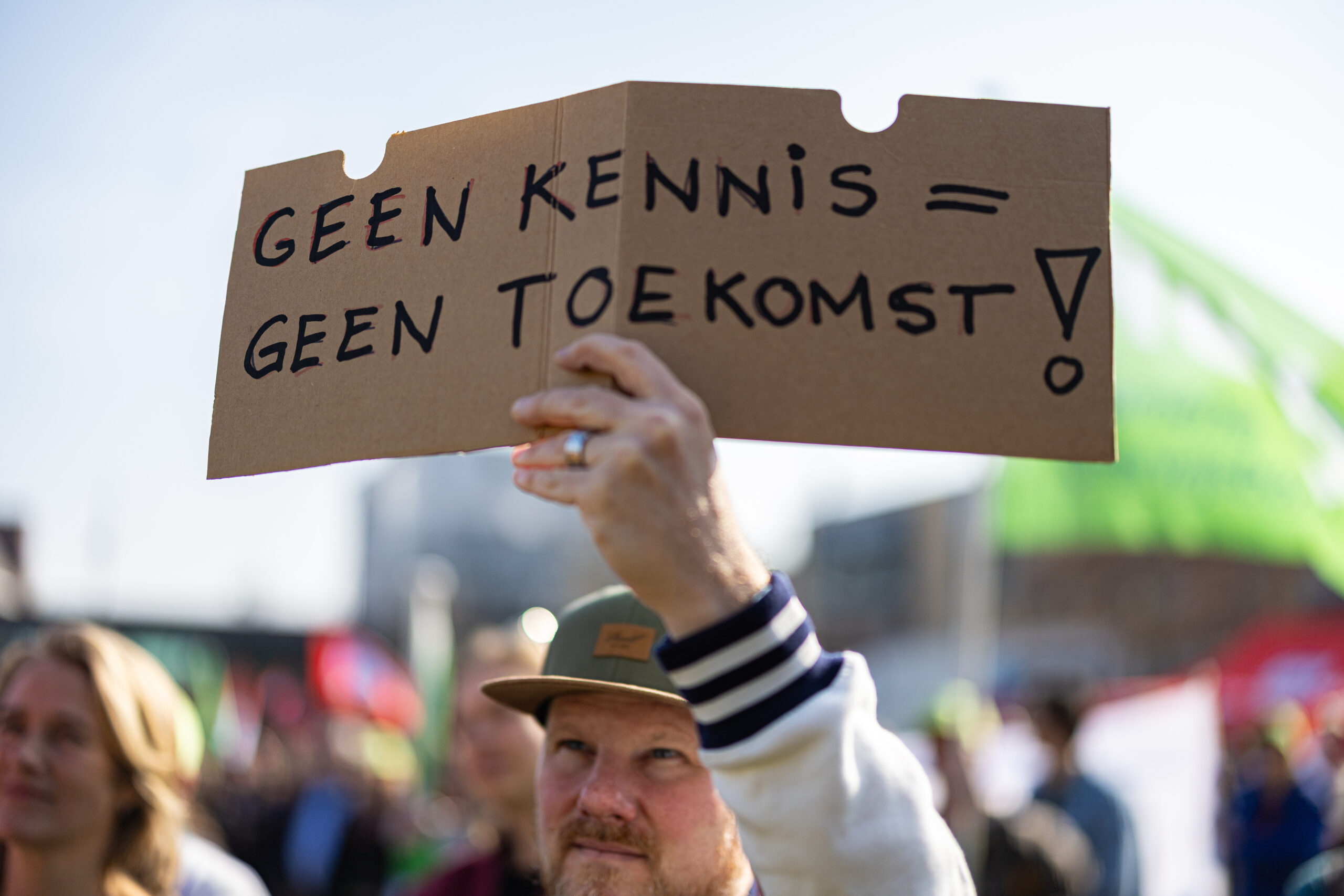Text Marieke Rotman and Willem Andrée
Dutch universities all face a financial squeeze in the coming year. WUR too will have a budget deficit: in 2023 the university had numerous extra costs, mainly staffing costs. And this year those costs are set to go up again. And yet, ‘we don’t have to rush into make all sorts of cutbacks,’ says the Executive Board.
‘We are going to have to be extra careful about our financial decisions in the coming period.’ An announcement to this effect appeared on the intranet on 31 January, after the university’s budget for 2024 was published. According to the budget, there won’t be enough money this year. The announcement reported that all the rising costs will also ‘have an impact on the decisions we make’.
New labour agreement
Last year a new collective labour agreement (CAO) was drawn up for the Dutch universities, enshrining a pay rise of 9 per cent. A similar rise was negotiated for Wageningen Research. Those rising wage costs are now one of the factors putting pressure on the budget. This is happening in other universities as well. In fact, it’s so bad that several unions including FNV wrote a joint letter of protest to the universities, flagging up the fact that several universities mentioned ‘worrying financial situations’ as a result of the rising wage costs. WUR was not one of them, though.
The ink on the CAO agreement was hardly dry when some employers announced that they were not going to cope with it financially
‘The ink on the CAO agreement was hardly dry when some employers announced that they were not going to cope with it financially,’ says Sander Wesdorp, a manager at FNV Education & Research. ‘Even though they were at the negotiating table themselves and voted for the pay rise, among other things. We didn’t think that was very classy of them. particularly considering the universities are being compensated for the rising wage costs by the ministry of Education, Culture and Science.’ Although precisely how much that compensation amounts to is shrouded in secrecy, he adds.
Deficit of millions
Meanwhile, several universities have more far-reaching financial troubles, says Wesdorp. ‘Falling student numbers, higher energy bills, more expensive accommodation: no one is swimming in money.’
For example, Leiden University expects to fall short by ‘a few million’ euros next year. At Erasmus University the figure is around 20 million, at Nijmegen 24 million and at Eindhoven they’re talking about 30 million. According to the multi-annual budget at the University of Groningen, there’ll even be a shortfall of over 70 million in 2024.
Wesdorp fears that this financial pressure will mean that contracts won’t be renewed, fewer vacancies will be announced and the work pressure will increase. ‘And the excessive work pressure at universities has been a cause for concern for us for a long time.’
Gap
Fortunately, the problems at WUR are not as big. According to the recently published university budget, the deficit in 2024 comes to 6.5 million euros, whereas in the past few years there has consistently been a positive result of between 10 and 20 million euros. Reading on, you can see that the difference comes largely from staffing costs, which are expected to go up by about 33 million euros. The explanation given for this is that there has been a staffing increase of 200 FTEs, coming on top of the higher salaries resulting from the new CAO agreements.
Are the rising staffing costs already noticeably affecting WUR’s activities? They are at Corporate Communication & Marketing (CC&M), says operations coordinator Erik Vleeming. ‘For 2024, there is a gap in the budget: wage costs went up a lot last year and we can’t respond to that quickly enough. That’s why there’s a deficit. At CC&M, the department has to absorb that itself.’ But, he adds, ‘it doesn’t seem as though it will cause major long-term continuity problems.’
‘More uncertainty’
Rens Buchwald, the Executive Board member responsible for finances, confirms that the good times are over. ‘We have had several very good years. So much money came in that we weren’t able to spend it all on projects because we wouldn’t have been able to get all the work done. But we could use it to appoint people to do the work. Now there are uncertain times ahead. The growth of the past few years is coming to an end and of course the future looks uncertain politically, especially regarding international students.’ There has been some sensible forward planning in the past few years, though, says Buchwald. ‘That’s why we don’t have to rush into all sorts of cutbacks.’ He confirms that the ministry of Education, Culture and Science is going to help cover the wage costs. ‘Broadly speaking, that 9 per cent will be compensated.’
So how should we read the intranet bulletin which talks about budget deficits that ‘will have an impact on the decisions we make’ and will bring ‘uncertainty’ with them. Buchwald: ‘The budget is tighter than it’s been in recent years. Even when there was a shortfall in some areas, we could implement pretty much everything we wanted to.’ The budgets of recent years show that there were other times when a deficit was expected, but that the result at the end of the year was still between 10 and 20 million euros in the black. Buchwald: ‘That was different last year, and it will be different again this year; I expect that this time the predicted deficit really will happen.’
Heated discussions
This has already led to some heated discussions, he says. Where there used to be more leeway, spending this year must not exceed the budget. And that can impact events like the WeDay or the Dies Natalis. On the other hand, Buchwald stressed, the higher costs won’t have immediate consequences for staff numbers or vacancies. ‘We don’t have to cut back.’ And what is meant by making decisions about ‘where the priorities lie’? ‘Well, they are always education, research, and the impact they have.’
A financial decision not to do something this year doesn’t necessarily constitute a cutback
It does mean that the chair groups are also going to scrutinize their budgets. ‘If it is harder for one department to get a study financed, or less money comes in from the ministry, then they will have to take a really good look at whether everything can go ahead this year. The responsibility for budgeting is shared by the whole organization. But a financial decision not to do something this year doesn’t necessarily constitute a cutback.’
What is Buchwald’s take on the FNV union’s concerns about staff and pressure? ‘The staff-student ratio has improved enormously here in recent years.’ According to the budget, the number of FTEs went up by 40 per cent in the past five years, and the intention is to keep it at that level.
The WUR Council, which has to approve the budget every year, declines to comment on the impact of the coming budget deficit. In March, the FNV and other unions start on the next round of negotiations on the CAO that comes into effect in 2025.

 Rens Buchwaldt: ‘The budget is tighter than it’s been in recent years. I expect that this time the predicted deficit really will happen.’ Illustration Valerie Geelen
Rens Buchwaldt: ‘The budget is tighter than it’s been in recent years. I expect that this time the predicted deficit really will happen.’ Illustration Valerie Geelen 

![[Comment] Freedom of degree choice](https://www.resource-online.nl/app/uploads/2025/02/shutterstock_2417739235-scaled.jpg)